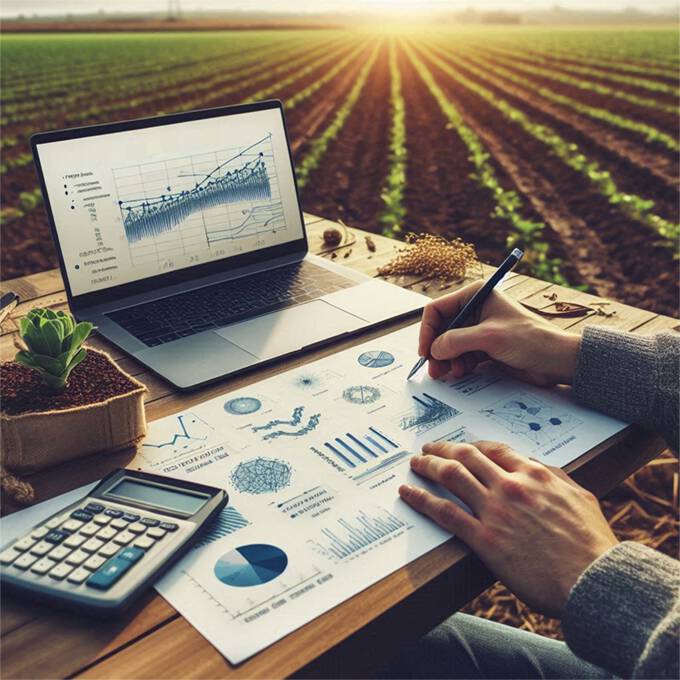
Artificial Intelligence (AI) has been making waves in various industries, and agriculture is no exception. One of the most promising applications of AI in agriculture is crop yield prediction. But how accurate is AI at predicting crop yields? Let’s get into the details to understand this better.
Understanding Crop Yield Prediction
Crop yield prediction involves forecasting the amount of crop that will be harvested from a specific area. Accurate predictions help farmers make informed decisions about planting, harvesting, and selling their produce. Traditionally, crop yield predictions have been made using historical data, weather patterns, and farmer experience. However, these methods can be time-consuming and often lack precision.
The Role of AI in Crop Yield Prediction
AI uses advanced algorithms and machine learning techniques to analyze vast amounts of data. This data includes historical crop yields, weather conditions, soil health, and even satellite images. By processing and analyzing this data, AI crop yield prediction can provide more accurate and timely predictions than traditional methods.
Key Components of AI-Based Crop Yield Prediction
- Data Collection: AI systems rely on large datasets to make accurate predictions. This data comes from various sources like weather stations, satellite imagery, and sensors placed in the fields.
- Machine Learning Algorithms: These algorithms process the collected data to identify patterns and make predictions. They can learn from past data and continuously improve their accuracy over time.
- Real-Time Analysis: AI can analyze data in real-time, providing farmers with up-to-date information about their crops. This helps in making timely decisions to enhance crop yield.
Factors Affecting AI Accuracy
Several factors influence the accuracy of AI in crop yield prediction:
- Quality of Data: The accuracy of AI predictions depends heavily on the quality and quantity of data it analyzes. Incomplete or inaccurate data can lead to incorrect predictions.
- Weather Variability: Weather is a significant factor in crop growth. Sudden changes in weather conditions can impact crop yields, making it challenging for AI to provide precise predictions.
- Soil Health: Soil quality varies from one location to another. AI systems need detailed soil health data to make accurate predictions. Any variation or lack of data can affect accuracy.
- Crop Management Practices: Different farming practices, such as irrigation methods, fertilization, and pest control, influence crop yield. AI must account for these practices to provide accurate predictions.
How Accurate is AI?
The accuracy of AI in crop yield prediction varies depending on the factors mentioned above. In ideal conditions, where data is abundant and accurate, AI can provide highly accurate predictions. Studies have shown that AI models can achieve up to 90% accuracy in some cases. However, the accuracy can drop if there are significant gaps in data or unexpected changes in weather conditions.
Benefits of Accurate AI Crop Yield Predictions
Accurate AI crop yield predictions offer several benefits to farmers and the agriculture industry:
- Optimized Resource Use: By predicting crop yields accurately and using advanced practices such as Precision Farming, farmers can optimize the use of resources such as water, fertilizers, and pesticides. This leads to cost savings and more sustainable farming practices.
- Informed Decision Making: Accurate predictions enable farmers to make better decisions about planting and harvesting times. This can help in maximizing crop yields and minimizing losses due to adverse weather conditions.
- Market Planning: Knowing the expected yield in advance helps farmers plan their marketing strategies. They can decide when to sell their produce to get the best prices, reducing the risk of market saturation.
- Risk Management: Accurate crop yield predictions allow farmers to manage risks better. They can take preventive measures in case of expected low yields or adverse weather conditions, safeguarding their investments.
- Improved Supply Chain Efficiency: With precise yield predictions, supply chain stakeholders, including distributors and retailers, can plan better. This reduces wastage and ensures a steady supply of agricultural produce to the market.
Challenges and Limitations
Despite the promising results, AI in crop yield prediction faces several challenges:
- Data Privacy and Security: Farmers need to share their data with AI systems for accurate predictions. Ensuring data privacy and security is crucial to gain farmers’ trust.
- High Initial Costs: Implementing AI systems can be expensive. Small-scale farmers may find it challenging to afford the technology, limiting its widespread adoption.
- Technical Expertise: Farmers need to understand and manage AI systems, which requires technical expertise. Providing training and support to farmers is essential for successful implementation.
The Future of AI in Crop Yield Prediction
The future of AI in crop yield prediction looks promising. As technology advances, we can expect improvements in data collection methods, machine learning algorithms, and real-time analysis. These advancements will enhance the accuracy and reliability of AI predictions, making them more accessible to farmers worldwide.
Additionally, collaborations between AI companies, agricultural organizations, and governments can help address challenges like data privacy, high costs, and technical expertise. By working together, we can ensure that AI technology benefits farmers of all scales and contributes to global food security.
Conclusion
AI has the potential to revolutionize crop yield prediction, providing farmers with accurate and timely information to optimize their farming practices. While there are challenges to overcome, the benefits of AI in agriculture are undeniable. As technology continues to evolve, AI will play an increasingly vital role in ensuring sustainable and productive farming practices worldwide.







